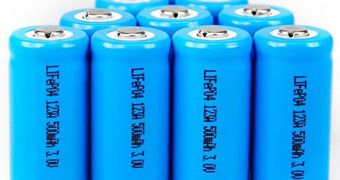As technology advances, it's becoming clearer that consumer electronics could benefit from a significant development of today's battery technology. Starting with mobile phones, portable computer systems, consumer electronics or the latest electrical cars, Lithium-Ion batteries are a significant part of our daily lives. On that note, Hitachi has recently announced that it has managed to come up with a new material that could potentially boost the capacity of today's Lithium-Ion batteries by a factor of two. The batteries could be used in smart grid applications, that being the main focus of the company.
According to a recent news report on Nikkei, Hitachi has teamed up with Shin-Kobe Electric Machinery Co. in an attempt to complete prototypes of the new batteries as early as the beginning of next year. The move better explains the company's expectations that Lithium-Ion batteries for the industrial use market could reach three trillion yen by 2020, or roughly 31.88 billion US$.
The breakthrough, according to the company, has been realized through the adoption of a special metal additive, which will apparently extend the battery's lifespan to more than ten years, double that of the current Manganese Lithium Ion batteries. In addition, Hitachi will continue to use manganese for the new batteries, instead of the more expensive cobalt, taking advantage of the stable supplies and relatively low prices.
While the advancements made by Hitachi might not end up serving the smartphone or the notebook market, the move is encouraging, especially since it could prove to be a necessary boost for the growing industry of hybrid vehicles. Ultimately, we could soon see a new technology, or an evolution of the current Lithium-Ion batteries, which might increase the time we can play with our electrical devices, especially since the entire PC industry appears to be moving towards the adoption of more portable computer devices such as slate PCs.

 14 DAY TRIAL //
14 DAY TRIAL //